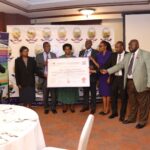The IGCSE is a globally recognized qualification designed for students aged 14 to 16, typically in Years 10 and 11. Administered by examination boards like Pearson Edexcel, it offers a broad curriculum that prepares students for further academic pursuits, such as A-Levels, International Baccalaureate (IB), or other post-secondary programs. In Kenya, KNEC collaborates with Pearson Edexcel to facilitate the registration, administration, and monitoring of IGCSE examinations, ensuring compliance with international standards while addressing local educational needs.
The November 2025 IGCSE session is particularly significant for Kenyan students, as it aligns with the academic calendar and provides an opportunity for private candidates and school-based learners to demonstrate their academic proficiency across various subjects.
Why Choose IGCSE in Kenya?
The IGCSE curriculum is highly valued in Kenya for its flexibility and international recognition. Here are some reasons why students opt for IGCSE through KNEC:
- Global Recognition: IGCSE qualifications are accepted by universities and employers worldwide, providing Kenyan students with opportunities for international education and careers.
- Diverse Subject Options: The curriculum offers a wide range of subjects, allowing students to tailor their studies to their interests and career goals.
- Rigorous Assessment: The IGCSE emphasizes critical thinking, problem-solving, and practical skills, preparing students for higher education.
- KNEC’s Oversight: KNEC’s involvement ensures that examinations are conducted with integrity, adhering to both local and international standards.
KNEC’s Role in IGCSE Examinations
KNEC is mandated by law to collaborate with foreign examination boards, such as Pearson Edexcel, to administer and monitor international examinations in Kenya. For the IGCSE, KNEC’s responsibilities include:
- Candidate Registration: Facilitating the registration process for both school-based and private candidates.
- Examination Administration: Overseeing the conduct of exams in designated centers across Kenya, including Nairobi, Mombasa, and Eldoret.
- Result Dissemination: Ensuring timely release and collection of results, as seen in the May/June 2025 session where results were available for collection at designated centers.
- Quality Assurance: Monitoring examination centers to prevent irregularities, such as impersonation or possession of unauthorized materials, as outlined in the KNEC Act No. 29 of 2012.
IGCSE Subjects Available for November 2025
For the November 2025 IGCSE session, KNEC has released a list of subjects offered through Pearson Edexcel, each with specific subject codes and paper options. Below is a detailed breakdown of the available subjects, their codes, and the papers candidates will sit for:
- Accounting (4AC1)
- Papers: 1 & 2
- Overview: Covers financial and management accounting principles, ideal for students interested in business and finance.
- Arabic (4AA1)
- Papers: 1 & 2
- Overview: Focuses on reading, writing, and comprehension skills in Arabic, suitable for students proficient in the language.
- Biology (4BI1)
- Papers: 1 & 2
- Overview: Explores biological concepts, including cell biology, genetics, and ecology, with practical and theoretical components.
- Business (4BS1)
- Papers: 1 & 2
- Overview: Introduces business concepts such as marketing, finance, and operations, preparing students for commerce-related careers.
- Chemistry (4CH1)
- Papers: 1 & 2
- Overview: Covers chemical reactions, organic chemistry, and laboratory techniques, emphasizing scientific inquiry.
- Chinese (4CN1)
- Papers: 1 & 2
- Overview: Tests proficiency in Mandarin Chinese, focusing on listening, reading, and writing skills.
- Commerce (4CM1)
- Papers: 1 & 2
- Overview: Examines trade, production, and economic systems, relevant for students pursuing commercial studies.
- Economics (4EC1)
- Papers: 1 & 2
- Overview: Analyzes economic principles, including supply and demand, market structures, and global economics.
- English Language Specification A (4EA1)
- Papers: 1 & 2
- Overview: Assesses reading, writing, and analytical skills in English, with a focus on literary and non-literary texts.
- English Language Specification B (4EB1)
- Paper: 1
- Overview: A single-paper option focusing on core English language skills, suitable for students seeking a streamlined assessment.
- English as a Second Language (4ES1)
- Papers: 1 & 2
- Overview: Designed for non-native English speakers, testing listening, reading, writing, and speaking skills.
- English Literature (4ET1)
- Papers: 1 & 2
- Overview: Explores literary texts, including poetry, prose, and drama, fostering critical analysis and interpretation.
- French (4FR1)
- Papers: 1 & 2
- Overview: Tests proficiency in French through reading, writing, and comprehension exercises.
- Further Pure Mathematics (4PM1)
- Papers: 1 & 2
- Overview: Advanced mathematics for students with a strong aptitude, covering topics like calculus and algebra.
- Geography (4GE1)
- Papers: 1 & 2
- Overview: Examines physical and human geography, including environmental issues and global patterns.
- History (4HI1)
- Papers: 1 & 2
- Overview: Covers historical events and themes, encouraging analytical skills and historical understanding.
- Human Biology (4HB1)
- Papers: 1 & 2
- Overview: Focuses on human physiology and health, complementing the standard Biology curriculum.
- Information and Communication Technology (ICT) (4IT1)
- Papers: 1 & 2
- Overview: Assesses digital literacy, software applications, and IT systems, vital for tech-driven careers.
- Mathematics Specification A (4MA1)
- Options: Foundation (1F & 2F) or Higher (1H & 2H)
- Overview: Covers algebra, geometry, and statistics, with tiered options for different ability levels.
- Mathematics Specification B (4MB1)
- Papers: 1 & 2
- Overview: An alternative mathematics curriculum with a focus on problem-solving and application.
- Physics (4PH1)
- Papers: 1 & 2
- Overview: Explores mechanics, electricity, and energy, combining theoretical and practical assessments.
- Science (Double Award) (4SD0)
- Papers: 1B, 1C, 1P
- Overview: Combines Biology, Chemistry, and Physics for students seeking a broad science qualification.
This diverse range of subjects allows students to select options that align with their academic strengths and career aspirations, from sciences and humanities to languages and technical subjects.
Important Notice for Candidates
KNEC has issued a critical notice for candidates who have previously taken Pearson Edexcel International Examinations:
- Provide Result Slips or UCI Number: Candidates must submit a copy of their previous result slips or their Unique Candidate Identifier (UCI) number during registration. This ensures accurate tracking of academic records and prevents issues during result processing.
Failure to provide this information may lead to delays or complications in result verification. Candidates are advised to contact their examination centers or KNEC directly for assistance with retrieving their UCI number if needed.
Registration and Examination Process
Registration Timeline
According to KNEC’s announcements, the registration for the November 2025 IGCSE examinations is part of the broader examination cycle, with specific timelines for candidate registration:
- Registration Period: Typically begins in early 2025, with deadlines set around March or April, as seen in previous cycles for KCSE and other exams.
- Process: Schools and private candidates must register through KNEC’s online portals, such as the Query Management Information System (QMIS) or the designated Pearson Edexcel platform.
- Nominal Rolls: Schools are required to print nominal rolls via the KNEC portal to confirm registered candidates.
Private candidates can register through KNEC, which collaborates with Pearson Edexcel to ensure seamless administration.
Examination Centers
Examinations are conducted at designated centers across Kenya, including:
- Nairobi: Foreign Examinations Office, New Mitihani House
- Mombasa: Uhuru na Kazi Building, Fourth Floor
- Eldoret: Designated collection and examination centers
Candidates must verify their examination center during registration and ensure they arrive on time for all papers.
Examination Guidelines
KNEC has outlined strict guidelines to maintain the integrity of the IGCSE examinations:
- Punctuality: Candidates must be seated 15 minutes before the start of each paper, with sessions beginning at 8:00 a.m. and 2:00 p.m. Latecomers may be denied entry unless exceptional circumstances are verified.
- Prohibited Items: Cell phones, unauthorized books, and electronic devices are strictly forbidden. Violators risk result cancellation.
- Materials: Candidates must bring mathematical and drawing instruments for relevant subjects, such as Mathematics, Physics, and Geography. Calculators are permitted for specified subjects.
- Examination Irregularities: As per the KNEC Act No. 29 of 2012, impersonation or other malpractices can lead to a two-year imprisonment, a fine of up to KSh 2 million, or a three-year ban from KNEC examinations.
Preparation Tips for November 2025 IGCSE Candidates
To excel in the November 2025 IGCSE examinations, candidates should adopt a strategic approach to preparation:
- Understand the Syllabus: Review the Pearson Edexcel syllabus for each subject to identify key topics and assessment objectives. Sample papers for subjects like Biology, Chemistry, and Mathematics are available on the KNEC website.
- Practice Past Papers: Familiarize yourself with the exam format by practicing past papers, which can be accessed through KNEC or Pearson Edexcel portals.
- Time Management: Allocate study time effectively across subjects, focusing on weaker areas while maintaining strengths. KNEC advises against spending too much time on a single question during exams.
- Join Study Groups: Collaborate with peers to discuss complex topics, especially in subjects like History or English Literature, which require analytical skills.
- Seek Teacher Support: Consult teachers for clarification on challenging concepts and to review mock exam performance.
- Use Approved Resources: Ensure all study materials align with the Pearson Edexcel curriculum to avoid irrelevant content.
Challenges and Considerations
Curriculum Changes
The Kenya Institute of Curriculum Development (KICD) has been reviewing curricula to align with the Competency-Based Curriculum (CBC). While the IGCSE remains unaffected by these changes, candidates should stay informed about any updates to subject content or examination formats.
Budget Constraints
Recent budget cuts in Kenya’s education sector, including a reported KSh 62 billion reduction, may impact examination administration. Candidates should verify registration fees and deadlines early to avoid disruptions.
Examination Integrity
KNEC’s strict measures against examination malpractices underscore the importance of adhering to guidelines. Candidates found with unauthorized materials or engaging in impersonation face severe penalties, including result cancellation and legal consequences.
How to Access Results
Results for the November 2025 IGCSE examinations are expected to be released in early 2026, following the timeline of the May/June 2025 session, which saw results announced on August 28, 2025. Candidates can collect their results at designated centers, such as:
- Nairobi: New Mitihani House
- Mombasa: Uhuru na Kazi Building
- Eldoret: KNEC-approved centers
Private candidates should ensure they have their UCI number or result slips from previous examinations to facilitate result collection.
Future Outlook for IGCSE in Kenya
The IGCSE continues to grow in popularity in Kenya due to its flexibility and international credibility. As KNEC strengthens its collaboration with Pearson Edexcel, more schools are expected to adopt the IGCSE curriculum, particularly in urban areas like Nairobi and Mombasa. The introduction of new subjects, such as Media Technology and Marine & Fisheries Technology under technical education, indicates a broader trend toward diversifying educational offerings in Kenya.
For students planning to pursue higher education abroad or in competitive local institutions, excelling in IGCSE examinations is a critical step. The November 2025 session offers a valuable opportunity to showcase academic excellence and prepare for future academic and professional endeavors.
The November 2025 IGCSE examinations, administered by KNEC in collaboration with Pearson Edexcel, offer Kenyan students a chance to earn a globally recognized qualification across a diverse range of subjects. From Accounting to Science (Double Award), the subject offerings cater to various academic interests and career paths. By understanding the examination process, adhering to KNEC’s guidelines, and preparing strategically, candidates can maximize their performance and achieve their academic goals.
For the latest updates, candidates should regularly check the KNEC website (www.knec.ac.ke) or contact their examination centers. With thorough preparation and adherence to KNEC’s regulations, students can approach the November 2025 IGCSE session with confidence and clarity.





